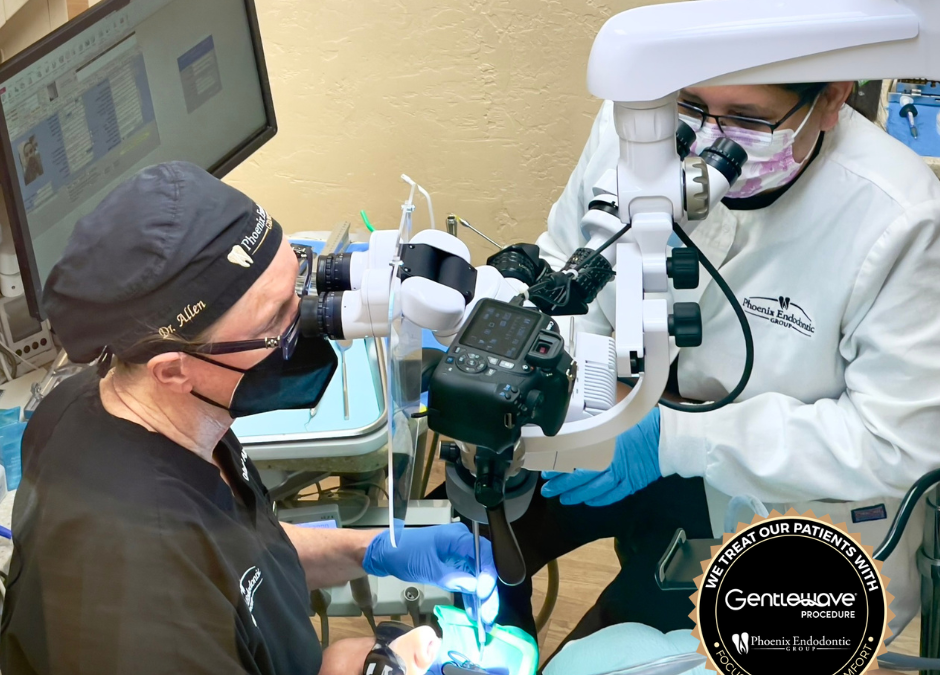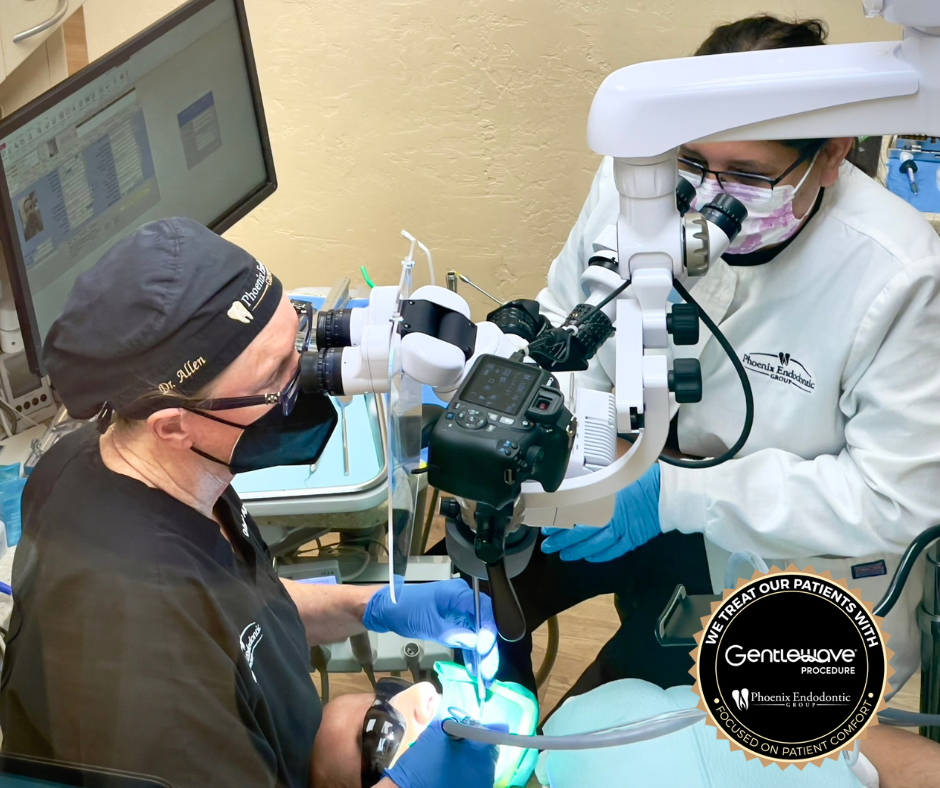
by Dr. Jacqueline S. Allen | May 10, 2023 | Blog, Endodontics, Endodontist, Save Your Tooth Month
Recent years have brought amazing advances in dental care. Veneers, crowns, and even dental implants are available to restore or replace many functions of natural teeth. Perhaps the most important advances of all relate to saving natural teeth, allowing you to use them for your entire lifetime.
The American Association of Endodontists (AAE) designates May as its “Worth Saving” public awareness month. This awareness campaign highlights the role that endodontists, who are highly trained dental specialists, play in saving natural teeth through root canal treatments and other techniques.

Reasons Natural Teeth Are Worth Saving
Given the replacement or restoration options dental professionals have when a natural tooth is compromised by decay or injury, why do endodontists work so hard to save your teeth?
1. Most people want to save their natural teeth. In a survey sponsored by AAE, 95 percent of respondents said it is important to save their natural teeth. In fact, nearly a quarter of Millennials (born 1980-1996) said saving their natural teeth is their top concern about saving or restoring their body.
2. Natural teeth have benefits that artificial restorations cannot mimic. Natural teeth have connections to the gum tissue around them through the periodontal ligament and an epithelial attachment. These connections help teeth adapt to changes when chewing or talking and also help sustain gum health. Dental implants lack these connections.
3. Treatments to save teeth are less invasive. A root canal treatment has less impact on your mouth than an extraction or implant. Your post-procedure pain and recovery time is also lessened.
4. Root canal treatments are often overall less costly. Teeth extraction by itself is not expensive, but implants can cost thousands, even if only one or a few teeth need replacement.
5. Treatments to save natural teeth are more cost effective. A 2009 British study determined that for a tooth that could be saved with a root canal treatment or a re-treatment of a previous root canal, the lifetime costs of endodontic treatment were equal or less than replacing it with an implant.
“Our natural teeth are designed to last a lifetime, and they can last a lifetime, with proper care and the assistance of endodontists if a tooth is badly infected or injured,” says Dr. Jacqueline S. Allen, who practices with the Phoenix Endodontic Group. “Our staff welcomes you to discuss your case with us. We’re happy to help you experience the benefits of saving your natural teeth.”

by Dr. Jacqueline S. Allen | Apr 25, 2023 | Blog, Root Canal
Few dental procedures are the subject of as much misinformation as root canals. The procedure has existed for hundreds of years. However, advances in medical knowledge and endodontic technology have continually refined how root canals are performed, as well as how effective they are.
If you have an infected or damaged tooth, and your dentist has recommended you get a root canal, you should carefully read the most up-to-date information available. Here are five timely fast facts related to root canals to help you understand what’s involved in the process and how it works.

5 Important Things To Know About Root Canals
1. Root canals treat tooth pulp that has become infected. The procedure is named for the canals in your tooth, which are filled with dental pulp containing nerves, blood vessels, and connective tissue. Dental pulp keeps your teeth alive.
2. Successful root canals can preserve natural teeth for a lifetime. Root canal treatment saves your teeth from extraction. The endodontist cleans the tooth canals and removes the infected dental pulp. Biocompatible material such as gutta-percha replaces infected pulp and the tooth receives a crown to protect it from further damage.
3. Endodontists specialize in performing root canals. Endodontics is a specialty field within dentistry. Endodontists have two to three extra years of training in methods for preserving natural teeth. Additionally, endodontists typically perform an average of 25 root canals a week, while a general dentist performs far fewer.
4. Root canals relieve pain rather than causing it. Modern root canals bear little resemblance to the procedures of even your parents’ or grandparents’ day. Patients overall report a significant decrease in pain after their root canal.
5. Root canal treatments have become far less invasive. Gentlewave technology, for example, is an exciting recent development in endodontics using fluid dynamics and special irrigating fluid to clean tooth canals more efficiently. This minimally invasive approach to root canal treatments results in even less postoperative pain than a traditional root canal.
“Patients who come to our practice are often very surprised how effective modern root canals can be in stopping tooth pain – and greatly relieved,” says Dr. Jacqueline S. Allen, who practices with the Phoenix Endodontic Group. “We are happy to speak with anyone about needing a root canal before they come in, so they can feel relaxed and confident.”

by Dr. Jacqueline S. Allen | Mar 21, 2023 | Blog, Endodontics, Endodontist, Phoenix Endodontic Group, Root Canal
Pain sends many patients to the dentist. This is certainly the case when it comes to patients who need root canals. However, not feeling pain does not mean you don’t need a root canal.
Root canals are an endodontic technique to preserve natural teeth that have irreversible pulpitis, an infection of the nerve pulp of a tooth not able to be treated successfully. This condition can result from severe decay or an injury to the tooth. Often there is pain, but not always.
Here are a few important reasons to look beyond pain to discover whether your tooth needs a root canal treatment.

Looking Beyond Pain – Root Canal Treatment
-
Your endodontist is looking for infection as the cause of your troubles, not pain. Inflammation in the tooth’s nerve pulp is the cause the endodontist is looking for. Pain can accompany inflammation, but it is not a reliable guide to diagnosis.
-
Pain is only one symptom of needing a root canal. Other symptoms include teeth that are sensitive to heat or cold, swelling of the face or gums, or teeth that become gray or discolored.
-
Your infection may be draining, perhaps temporarily reducing pain, but also pouring foul toxins into your mouth. A pimple on the gum, called a fistula, or other types of pus drainage from the tooth are also symptoms of pulpitis. These conditions may temporarily reduce your pain, but the tooth will still need treatment: a root canal.
-
Pain associated with inflamed nerve pulp can be inconsistent. If your dentist puts you on an antibiotic to deal with an infected tooth, your pain may be relieved. Your pain may go away on its own, but this might be because the nerves in your tooth have died – not because the tooth is healthy again. Some patients who require root canals report “positional pain,” pain that emerges only when they sit up, lay down, or run in place.
“Determining whether a patient needs a root canal can be complex, and pain is only one factor considered in an evaluation,” says Dr. Jacqueline S. Allen, who practices with the Phoenix Endodontic Group. “Regular checkups with your general dentist and referrals to endodontic specialists as needed are the most reliable way to know if your natural teeth need a root canal to save them.”

by Dr. Jacqueline S. Allen | Feb 20, 2023 | Blog, Dental Implants, Dentistry
Dental implants have provided many of us with reliable, attractive, and functional teeth in recent decades. Smiles impacted by total or partial natural tooth loss have been restored to their previous luster – or better!
However, while dental implants have a success rate upwards of 95 percent, failure is possible. You can feel more confident about having a dental implant procedure, and protect your investment in a future that includes robust oral health, if you understand several key factors leading to dental implant success.

What Makes A Dental Implant Successful?
- An accurate diagnosis. Making sure that dental implants are a workable approach to addressing failing or missing teeth is a crucial first step. Your dental professional will do a thorough dental examination, ask questions about your overall health, and assess your gums and your jaw’s bone density.
- Prompt execution of the dental implant procedure. Once it’s been determined that dental implants your solution, planning should begin immediately. Dental implants are completed in stages, with healing time in between each one, so the sooner the process begins, the better.
- Systemic health concerns are addressed. Diabetes, smoking, low bone density, and gum infection can all make your dental implant more likely to fail. Discuss any health issues with your practitioner and follow their directions, as well as those of the rest of your care team.
- A skilled practitioner using up-to-date technology. Dental implants go more smoothly when a dentist has additional training in implants and has the tools to place the implants accurately. The Phoenix Endodontic Group, like many practices that place dental implants, utilizes cone-beam computed tomography (CBCT) technology, providing 3-D images of our patients’ soft tissues, teeth, nerves, and bone in one scan.
- Your commitment to ongoing care. Your commitment to proper self-care can make or break a dental implant’s success. To avoid the most common reasons for dental implant failure, you’ll need to brush and floss your implants daily, visit your dentist regularly for checkups, get LOTS of calcium, and proactively address conditions that damage your mouth, such as smoking and bruxism (grinding your teeth).
“Many of our dental implant clients do not initially realize that the success of the implant procedure requires partnership between them and their dental professional,” says Dr. Jacqueline S. Allen, who practices at the Phoenix Endodontic Group. “Our staff work closely with clients before, during, and after the dental implant process to ensure best results.”

by Dr. Jacqueline S. Allen | Jan 23, 2023 | Blog, GentalWave, Root Canal
When it comes to saving natural teeth, endodontists are always on the lookout for new technology and techniques to make procedures less painful, more efficient, and more likely to provide long-term successful treatment. The Phoenix Endodontic Group has recently added the new GentleWave G4 system for root canals.
GentleWave takes a substantially different approach to root canal treatment, using multisonic vibration and fluid dynamics to cleanse and reshape even the most unusual and complex tooth root systems. We are excited to be one of only two practices in Arizona to be employing this technology.
Here’s a quick overview of how GentleWave differs from a traditional root canal and why these differences add up to a better overall experience.

Advantages Of The GentleWave System During Root Canal Treatment
- GentleWave is minimally invasive. The most impactful difference is the GentleWave system requires endodontists take far less time using files to clean and reshape canals.
- GentleWave uses fluid dynamics to clean away infection. The irrigating fluid used in the GentleWave system passes through a narrow opening on the instrument used by the endodontist, creating a cascade of tiny imploding vapor bubbles. These mini-explosions create shockwaves that separate bacteria, biofilm, and debris from the tooth.
- GentleWave’s reliance on fluid movement allows it to clean even challenging root canals. The system leverages the power of the irrigating fluid’s journey through the tooth to remove more than 98 percent of bio-film and organic tissue, even in canals the endodontist has not previously been able to detect!
- GentleWave procedures result in less post-procedure discomfort. More than 96 percent of patients treated with GentleWave report little or no pain 48 hours after the procedure.
- The GentleWave system can reduce treatment time for patients. Many patients treated with GentleWave can be done with their root canal treatment in a single session.
“GentleWave, in my experience and that of other endodontists, is proving to be a game-changer in terms of saving natural teeth,” says Dr. Jacqueline S. Allen of the Phoenix Endodontic Group. “Our staff is happy to explain how GentleWave works and discuss whether it is an option for your specific treatment.”

by Dr. Jacqueline S. Allen | Dec 20, 2022 | Blog, Endodontics, Endodontist, Root Canal
More than 41,000 root canal treatments are performed each day in the United States – more than 15 million each year. Threats to your natural teeth leading to a root canal are not complicated, but each person’s experience of their symptoms can be unique.
Let’s look at some of the causes and symptoms of tooth infections that can result in a root canal. If you experience any of these symptoms, contact your dentist or endodontist immediately to schedule an examination.

The Two D’s Of Tooth Root Infection
Root canal treatment has proven to be one of the most effective ways to deal with infection in the pulp of the tooth. The infection is usually related to two major culprits: damage to the tooth structure that lets in bacteria, or advanced decay reaching the interior areas of the tooth. Such an infection might show in a variety of symptoms.
Symptoms Indicating A Root Canal Is Needed
1. Persistent pain in a tooth. A healthy tooth does not hurt. While tooth pain can require other treatments beyond or in addition to a root canal, constant or recurring tooth pain should definitely prompt a visit to your dental provider.
2. A pimple or “gum boil” near the infected tooth. Dying tissues in the tooth can cause a buildup of fluid under the gum surface. If the boil bursts, the fluid will have an unpleasant taste and odor.
3. Swollen gums near the infected tooth. Your gums may feel tender or look swollen, even if there is no gum boil present. This swelling can be intermittent, so you may not be in the clear even if the swelling goes away for a while.
4. Sensitivity to sources of heat and cold. An infected tooth can feel pain or sensitivity to hot or cold food and drink, even long after you’ve consumed it. The sensation can be anything from a sharp pain to a dull ache.
5. Your tooth feels loose when you touch it. The tooth infection can seep acidic wastes that soften the bone around the tooth needing a root canal, making it feel loose inside your mouth.
6. The tooth is discolored. The roots of a badly infected tooth may be receiving a poor supply of blood, which can make it look darker than usual.
Clearly, it’s difficult to know if you need a root canal without a thorough dental examination. If you have one or more of these symptoms, make an appointment now to get an official diagnosis.
“Symptoms of dental issues requiring a root canal can be highly individualized,” says Dr. Jacqueline Allen, Phoenix Endodontic Group. “Our endodontists will evaluate your symptoms and plan your treatment so you can save your tooth and stop hurting.”












